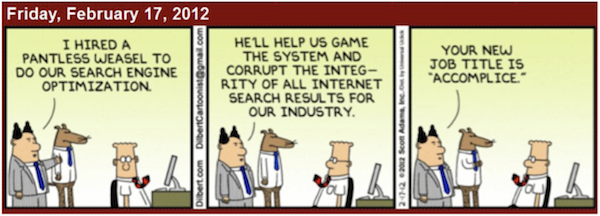
On the heels of yet another “SEOs are just gaming the system and taking advantage of poor users” article, it’s time to set the record straight about “gaming the system.” Why do so many use our terms so incorrectly? And does Google really hate SEOs?
I know all these questions have been addressed in this or that article, like in my discussion with Ken Krogue in his Forbes piece or in the latest letter by Senator John D. Rockefeller to Matt Cutts about SERPs and moving companies. Yet why is there so much confusion about search engine optimization? In an attempt to clear things up, let’s take a basic look at SEO ethics with some terms and definitions.
Before we dive in, it’s important to note that every SEO professional has their own opinion and what follows are just mine, though I believe them to be shared by others I know, respect, and speak with on panels at search marketing conferences from time to time. No doubt others will vehemently disagree, but hey that’s OK too.
White, Gray, Black – Why Do SEOs Wear so Many Hats?

Image Credit: Google Blogoscoped
We don’t actually wear any hats. Hats are just a term used by those who work in the search industry to easily explain tactics to those outside the industry.
Once upon a time, tactics were defined by a handful of search engines. Now, SEO tactics are defined and controlled by the big daddy of search: Google. So let’s quickly define what is a hat and what a hat means.
Hats of Many Colors!

A hat color is simply a tactic used to help a site rank. The color is determined by how pure your tactics are or how closely you stick to a search engine’s terms of service or conditions. That is all. Not good or bad.
Unless – and here is the ethical conundrum – you do not tell your client the risk! If you are using a tactic that can get your client’s site thrown out of the index and they do not know, you are not a black hat SEO. You are an unethical SEO. Period. Don’t confuse the two.
Hats are simply a tactic. Color is the purity of the tactic according to how close you are to the webmaster guidelines of the search engine you have chosen as your police officer.
OK, now that you understand that hats are just tactics, colors are just how closely the rules are followed, and the ethics are in the reveal, what do the hat colors mean?
White Hat – 100 Percent Pure!
If you use a white hat tactic, it means you staying within the terms and conditions set by your police officer (your chosen search engine, which will be Google for 99 percent of you).
This means you are being pure and untainted in your approach. Following the rules. Going 55 mph and not 1 mph over the posted speed limit.
Not all SEO professionals choose white hat as some moralistic stance on other SEOs. For many it is just common sense.
Going white hat means going by the search engine’s rules. If you go by the search engine’s rules, when an update comes it is much less likely you will be affected. Why? Because the police officer isn’t looking for you; the police officer is looking for the rule breaker.
White hats drive in the right lane, while the black Lamborghini is getting pulled over and given a ticket for speeding 50 mph over the limit in the fast lane. Granted, it’s quite possible that Lamborghini may never get that ticket as you’re watching it zoom by, but that doesn’t mean there isn’t a cop just a few miles up the road waiting with a radar gun.
Now let’s be honest here: a true white hat SEO is as rare as snow in Vegas. Why? Because almost no SEO professionals want to wait for a natural link profile to build (and oddly enough, when I have seen these types of link profiles, they look almost fake).
Whether building or buying, links are the way Google determines if people like you. Links come and go, but links are rarely all natural.
Having said that, some very large and well-known sites and marketers use strategies to attract natural links, but those too are as rare as hen’s teeth.
Impatience, budget, and lack of understanding all factor into the need for a gray hat plan.
Gray Hat SEO – Mixing it up!
Gray hat is a tactic that is merely a mixture of pure white, do only what Google (or whoever) tells us we can and then add a dash of strategies that bend the rules a little.
So for example, if pure gray hat you might build links to your site through link distribution methods, but never would you purchase links directly from a link seller. Or you would write content is great quantities, knowing it isn’t perfectly relevant, but making sure it is of some quality, relevance, and substance, but you would never use a content spinner.
This method is commonly used to help speed up results, but minimize the risk of penalties by the search engines.
If done by someone with excellent skills and a lot of experience, it will appear natural and the site will seem to have acquired its algorithm weights naturally.
If not careful, this can appear to slip into black hat SEO.
Black Hat SEO – Evil?

There are two forms of black hat SEO. It can get very confusing because they are never really clearly separated by definition. Also, depending on which space or vertical you work in, both forms of black hat SEO can mean very, very different things.
For the purposes of this article I am going to draw a hard line. Black hat SEO is not negative SEO or competitive leveling (a term I much prefer); it is the tactics you use that are specifically forbidden by the search engine.
So if you were using Google as your police officer, buying links would be considered black hat. If Bing is your police officer, something such as buying Facebook likes would be black hat.
Black hat tactics are generally the target of Google updates such as Penguin and can be seriously detrimental to a site if they are discovered.
Black hat SEO is incredibly difficult because you have to get under the radar, not be discovered, and not get your client fire bombed.
If you’re unable to successfully do this 99.999 percent of the time, you should never do this on a main site (personally I think you should never do this on a main site anyway) and if doing it on burner sites your success rate better equal your pay rate and the client better know what they are asking you to do and what they penalties might be for doing it.
Black Hat SEO & Search Engine Result Quality
Does any of this mean anything about the quality of the search results? So far, nope!
Overstock used black hat, so did BMW and JCPenney. All these hats and colors are again just tactics for ranking sites. Did the index suffer because Overstock was there? Did you feel you got a lesser experience if you got JCPenney? Probably not.
Now in fairness, lower quality sites tend to not to meet as many points on the algorithm, so they tend to use fewer white or gray hat techniques and lean toward the black hat where a site with great content, code, design, user base, time on site metrics, internal links (I could go on) will be able to rank without risking penalty, so they will generally stay on the lighter side of life.
Does this mean lower quality sites are lesser sites? Also nope!
I have seen plenty of Fortune 500 websites with totally “crap” sites because the marketing department thought that a totally unusable site with a pretty picture was a better experience than one the user could, you know, use! When SEO professionals talk of quality, they are talking in terms of the search engines’ interpretation of quality, not the money or name behind the site.
Now, since a site can even be removed from the index, if found using these tactics. Does this make these tactics bad? Does this make black hat SEO evil? Not at all, as we discussed it is merely a tactic.
Google or your search engine may not like a certain tactic, but that doesn’t make it bad. With this caveat – except if the client doesn’t know the risk or if you suck at it.
Huh? That is insulting, isn’t it? Yep, sorry, but if you suck at black hat SEO and you’re using it, I don’t care if your client knows the risk. You are as bad as if they didn’t.
Asshat SEO

If you do suck at black hat SEO, or just do it to make money and suck at it, well you’re a very, very special type of SEO. You, my friend, are an asshat SEO. Asshat SEOs aren’t SEOs at all, but they make money using our techniques while making the rest of us look bad.
Again, if you use tactics against the search engines terms of services that are known to create penalties and do not inform your client you are not black hat, you are an asshat!
If you are not good at black hat, but endanger your clients even when they know the risks, you’re an asshat! Get out of the SEO pool!
And if you are just someone who has a shady agency with link wheels and blog rings and false directories “building links” that are easily detected with common Class C IP address blocks, or use of Google Analytics, so you can cash big checks before the sites even fall then you are an asshat, and should stop soiling the names of SEOs who really do their work.
All that being said, there are many legitimate SEOs with as many legitimate uses for black hat SEO tactics, because it’s just a tactic, that when done right can equal quick gains for clients.
So What About Negative SEO or Competitive Leveling?
As the saying goes, SPAM just stands for Sites Positioned Above Mine.
These are techniques where you just take out your competition, so as your site works its way up it has less to work its way through.
This is akin to blowing up the sidewalk outside your competitors real world brick and mortar, but others see it as all part of the search game. Where you stand is all a matter of your ethics, but beware, some of it is highly illegal and could land you in jail if discovered.
I would rather just do a better job than the other guy. Way more fun!
I liken it to any competition. Do I really win if I knocked the guy’s leg out with a crowbar before the race? When I win, I want to know I honestly creamed ya! But hey that is just me.
OK, now that you understand that hats are tactics, color levels of compliance to the terms of service, and negative leveling is an ethics decision, what does Google think of SEOs?
Google Must Hate SEOs! Look at What They do!
 Nope! Why would they?
Nope! Why would they?
Think about this for a moment. Google has a huge group of people trained to make sure they create websites the way Google wants them. Saying Google hates SEOs would be like saying governments would hate citizens who self-trained themselves to follow all the rules.
Remember, Google has a product, the information it serves and if that information is no good then Google has no value. Google wants better websites and gets them from SEO professionals.
But if you don’t believe me, look what Google’s Distinguished Engineer Matt Cutts had to say when asked at SMX Advanced 2012 whether Google hates SEOs.
”No. Google likes SEOs who follow the Google Webmaster Guidelines. The updates are directed toward black hat SEO,” Cutts said. “It’s a war on spam. If you go on the black hat forums, there’s a lot of people asking, ‘How do I fake sincerity? How do I fake being awesome?’ Why not just be sincere and be awesome?”
So, Wrapping It Up!

Next time a senator or Forbes writer or whoever has a pen in hand and a lack of understanding about how search engines work blames SEO professionals for the poor state of affairs for users, you can mention to them in this day of meta data, big data, reviews, personal recommendations, Twitter, Facebook, Google+ and all things social at the users fingertips to help them discern the good from the bad, the real from the fraud; 90 percent never go past Page 1.
Users have everything they need to help decide whether a moving listing is a broker or a company; unfortunately they might have to spend more than five minutes doing the research.
We all know search engines aren’t perfect and sometimes junk gets in (OK, a lot of times) and there are a lot of untalented, uneducated, or unknowing people who call themselves SEOs just like there are bad accountants, lawyers, doctors, heck even candlestick makers.
However, it is time people who write articles, who condemn the engines and us, to start looking to blame those asshats who take advantage of the industry techniques who are SEOs in name only and those users who just never bother to go any further in the results than number 1.
Final Thought
For those of us who do our jobs, we work hard to stay current, which can mean changes every hours of the day sometimes. Those of us who practice, who learn, who test, who spend hours of every day trying to figure out the best way to serve our clients and our own, all we ask is you who write about us, spend some time educating yourselves on what we actually do before you write another SEOs are _____ article.





 Nope! Why would they?
Nope! Why would they?